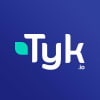We ran it for a while, but then we decided to move away from Tyk, because Tyk's cloud version, the SaaS version, has a significant limitation of limited flexibility, so you can't program very much. If you need anything customized, Tyk's cloud solution isn't for you. On the cloud version allowing customization is something, I'd like to see. I would like the ability to add custom headers to the request. I would like to see customizability included. Most API gateways, in my opinion, lack orchestration capabilities. If they can solve that really well, they will be able to quickly rise to the top of the market.




